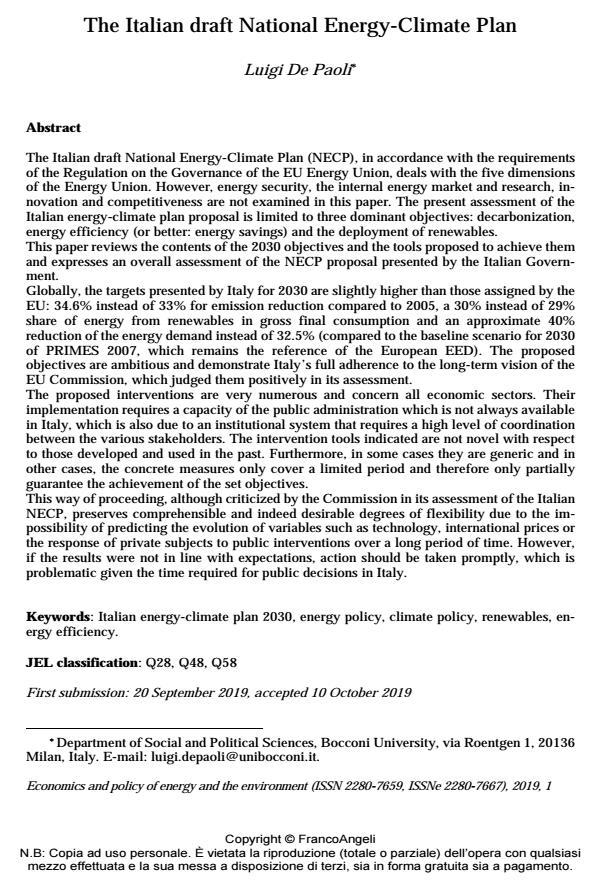The Italian draft National Energy-Climate Plan
Titolo Rivista ECONOMICS AND POLICY OF ENERGY AND THE ENVIRONMENT
Autori/Curatori Luigi De Paoli
Anno di pubblicazione 2019 Fascicolo 2019/1
Lingua Inglese Numero pagine 22 P. 97-118 Dimensione file 147 KB
DOI 10.3280/EFE2019-001007
Il DOI è il codice a barre della proprietà intellettuale: per saperne di più
clicca qui
Qui sotto puoi vedere in anteprima la prima pagina di questo articolo.
Se questo articolo ti interessa, lo puoi acquistare (e scaricare in formato pdf) seguendo le facili indicazioni per acquistare il download credit. Acquista Download Credits per scaricare questo Articolo in formato PDF

FrancoAngeli è membro della Publishers International Linking Association, Inc (PILA), associazione indipendente e non profit per facilitare (attraverso i servizi tecnologici implementati da CrossRef.org) l’accesso degli studiosi ai contenuti digitali nelle pubblicazioni professionali e scientifiche.
The Italian draft National Energy-Climate Plan (NECP), in accordance with the requirements of the Regulation on the Governance of the EU Energy Union, deals with the five dimensions of the Energy Union. However, energy security, the internal energy market and research, innovation and competitiveness are not examined in this paper. The present assessment of the Italian energy-climate plan proposal is limited to three dominant objectives: decarbonization, energy efficiency (or better: energy savings) and the deployment of renewables. This paper reviews the contents of the 2030 objectives and the tools proposed to achieve them and expresses an overall assessment of the NECP proposal presented by the Italian Government. Globally, the targets presented by Italy for 2030 are slightly higher than those assigned by the EU: 34.6% instead of 33% for emission reduction compared to 2005, a 30% instead of 29% share of energy from renewables in gross final consumption and an approximate 40% reduction of the energy demand instead of 32.5% (compared to the baseline scenario for 2030 of PRIMES 2007, which remains the reference of the European EED). The proposed objectives are ambitious and demonstrate Italy’s full adherence to the long-term vision of the EU Commission, which judged them positively in its assessment. The proposed interventions are very numerous and concern all economic sectors. Their implementation requires a capacity of the public administration which is not always available in Italy, which is also due to an institutional system that requires a high level of coordination between the various stakeholders. The intervention tools indicated are not novel with respect to those developed and used in the past. Furthermore, in some cases they are generic and in other cases, the concrete measures only cover a limited period and therefore only partially guarantee the achievement of the set objectives. This way of proceeding, although criticized by the Commission in its assessment of the Italian NECP, preserves comprehensible and indeed desirable degrees of flexibility due to the impossibility of predicting the evolution of variables such as technology, international prices or the response of private subjects to public interventions over a long period of time. However, if the results were not in line with expectations, action should be taken promptly, which is problematic given the time required for public decisions in Italy.
Parole chiave:Italian energy-climate plan 2030, energy policy, climate policy, renewables, energy efficiency.
Jel codes:Q28, Q48, Q58
- Impact of Key Drivers on Energy Intensity and GHG Emissions in Manufacturing in the Baltic States Vaclovas Miskinis, Arvydas Galinis, Viktorija Bobinaite, Inga Konstantinaviciute, Eimantas Neniskis, in Sustainability /2023 pp.3330
DOI: 10.3390/su15043330 - European Roadmaps to Achieving 2030 Renewable Energy Targets Giacomo Di Foggia, Massimo Beccarello, in SSRN Electronic Journal /2024
DOI: 10.2139/ssrn.4770915 - European roadmaps to achieving 2030 renewable energy targets Giacomo Di Foggia, Massimo Beccarello, in Utilities Policy 101729/2024 pp.101729
DOI: 10.1016/j.jup.2024.101729 - The draft update of Italy energy-climate plan: A critical review Luigi De Paoli, in ECONOMICS AND POLICY OF ENERGY AND THE ENVIRONMENT 1/2024 pp.55
DOI: 10.3280/EFE2024-001005 - Computational Science and Its Applications – ICCSA 2022 Workshops Francesco Tajani, Pierluigi Morano, Felicia Di Liddo, Endriol Doko, Carmelo Maria Torre, pp.15 (ISBN:978-3-031-10547-0)
Luigi De Paoli, The Italian draft National Energy-Climate Plan in "ECONOMICS AND POLICY OF ENERGY AND THE ENVIRONMENT" 1/2019, pp 97-118, DOI: 10.3280/EFE2019-001007